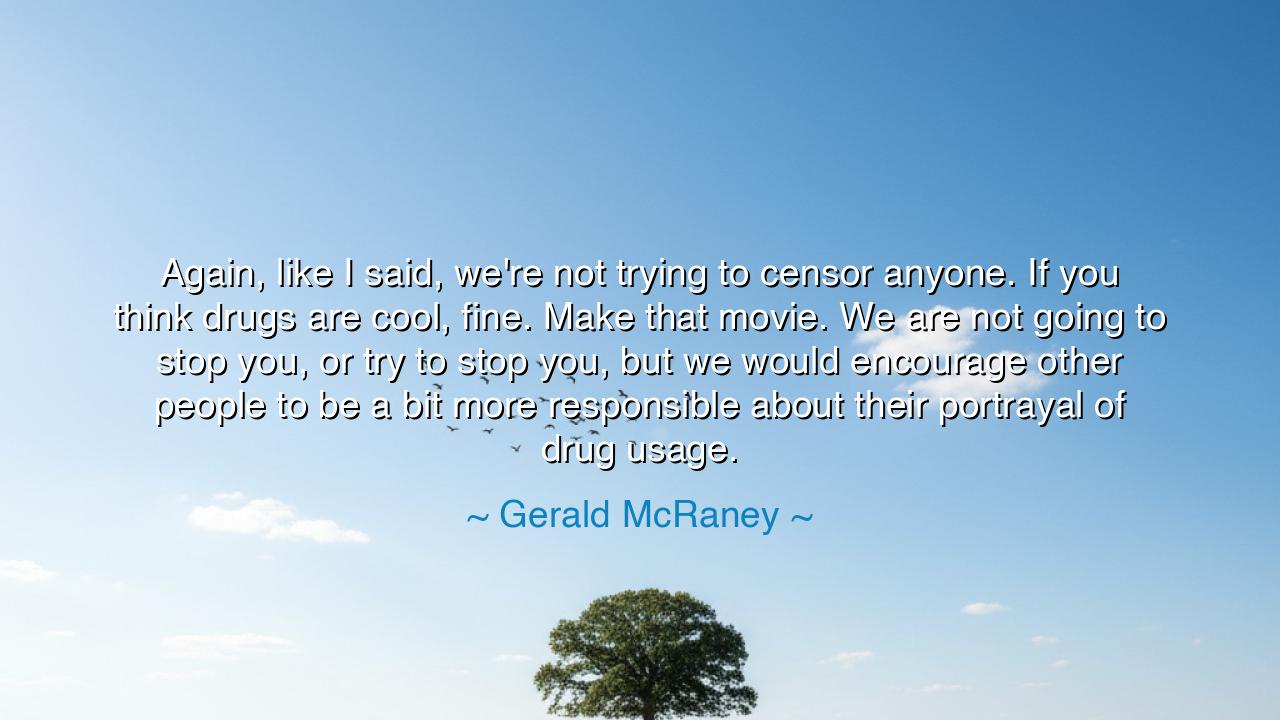
Again, like I said, we're not trying to censor anyone. If you
Again, like I said, we're not trying to censor anyone. If you think drugs are cool, fine. Make that movie. We are not going to stop you, or try to stop you, but we would encourage other people to be a bit more responsible about their portrayal of drug usage.






In the long and storied journey of human civilization, there has always been a tension between freedom of expression and the responsibility we hold toward the well-being of society. Gerald McRaney’s words, “Again, like I said, we’re not trying to censor anyone. If you think drugs are cool, fine. Make that movie. We are not going to stop you, or try to stop you, but we would encourage other people to be a bit more responsible about their portrayal of drug usage,” capture this delicate balance. McRaney advocates for freedom of expression, acknowledging the importance of allowing diverse voices and perspectives, yet he also calls for responsibility in how certain topics, like drug usage, are portrayed. This tension between freedom and responsibility has echoed through the ages, from the ancient world to the modern day.
The ancients, particularly the Greeks and Romans, were keenly aware of the influence that art and stories could have on shaping the moral fabric of society. In Plato’s Republic, he famously spoke of the role of poetry and storytelling in shaping the souls of citizens. Plato argued that storytellers—whether in plays, epic poems, or other forms—had the power to either elevate the soul by depicting virtuous actions or corrupt it by showcasing vice without consequence. Just as McRaney acknowledges the freedom of expression, he also understands that with freedom comes the responsibility to portray such complex issues with awareness of their impact. Like the ancient philosophers, McRaney encourages a careful balance between freedom and moral responsibility.
The ancient Romans took a similarly nuanced approach to the role of entertainment and drama in society. Seneca, a Stoic philosopher, recognized the profound effects that tragic theater could have on the audience’s emotions and moral sensibilities. His work often reflected the belief that art should serve a higher purpose, instructing audiences on virtue and the consequences of immoral behavior. While the Romans enjoyed their gladiatorial games and dramatic performances, there was always an underlying belief in catharsis—the purification of emotions through art, which could lead to a better understanding of right and wrong. McRaney’s call for responsible portrayals of drugs reflects this ancient ideal: while art should remain free, it should also serve to uplift and educate, guiding society toward responsible choices.
The modern world, however, has seen a departure from this ancient balance, with the rise of entertainment that often showcases excessive violence, substance abuse, and other forms of destructive behavior. McRaney’s call to responsibility serves as a reminder that freedom of expression does not come without the duty to consider the impact of our portrayals. Consider the 1960s counterculture and its romanticization of drug use in popular media, where the free-spirited use of drugs was depicted as an act of liberation. This narrative, though well-meaning in its search for freedom and personal expression, has since been critiqued for its lack of acknowledgment of the destructive effects that unchecked drug use can have on individuals and society. McRaney’s encouragement of responsibility in media reflects an understanding that while freedom of speech should be protected, ethical considerations must guide the stories we choose to tell.
The lesson from McRaney’s words is profound: while we must protect the freedom of expression, we must also acknowledge our collective responsibility to consider the consequences of how we choose to portray complex issues such as drug usage. In ancient cultures, storytellers were seen as moral guides, and while the world has changed, the essence of that responsibility has remained. Whether in the arts, media, or politics, the choices we make in what we communicate have the power to either uplift or harm the fabric of society. McRaney’s insight is a call for maturity in the arts, one that recognizes the power of media not only to entertain but to shape minds and moral outlooks.
In your own life, consider the messages you contribute to the world. Whether through art, words, or actions, ask yourself how you can maintain balance between freedom and responsibility. Are you aware of the impact your creations or actions may have on those who consume them? Just as McRaney encourages responsibility in the portrayal of drug use, so too must you consider how your choices reflect your values and contribute to the greater good. The path forward is one of freedom with awareness, where the power of self-expression is tempered with the wisdom to make choices that promote health, well-being, and responsibility.
Embrace the idea that freedom and responsibility can exist together in harmony. Express yourself, but do so in a way that considers the impact on those who come after you. Like the ancient storytellers, you can use your voice and creative energy to help guide the world toward understanding and virtue, just as McRaney urges us to do in the stories we share today.






AAdministratorAdministrator
Welcome, honored guests. Please leave a comment, we will respond soon